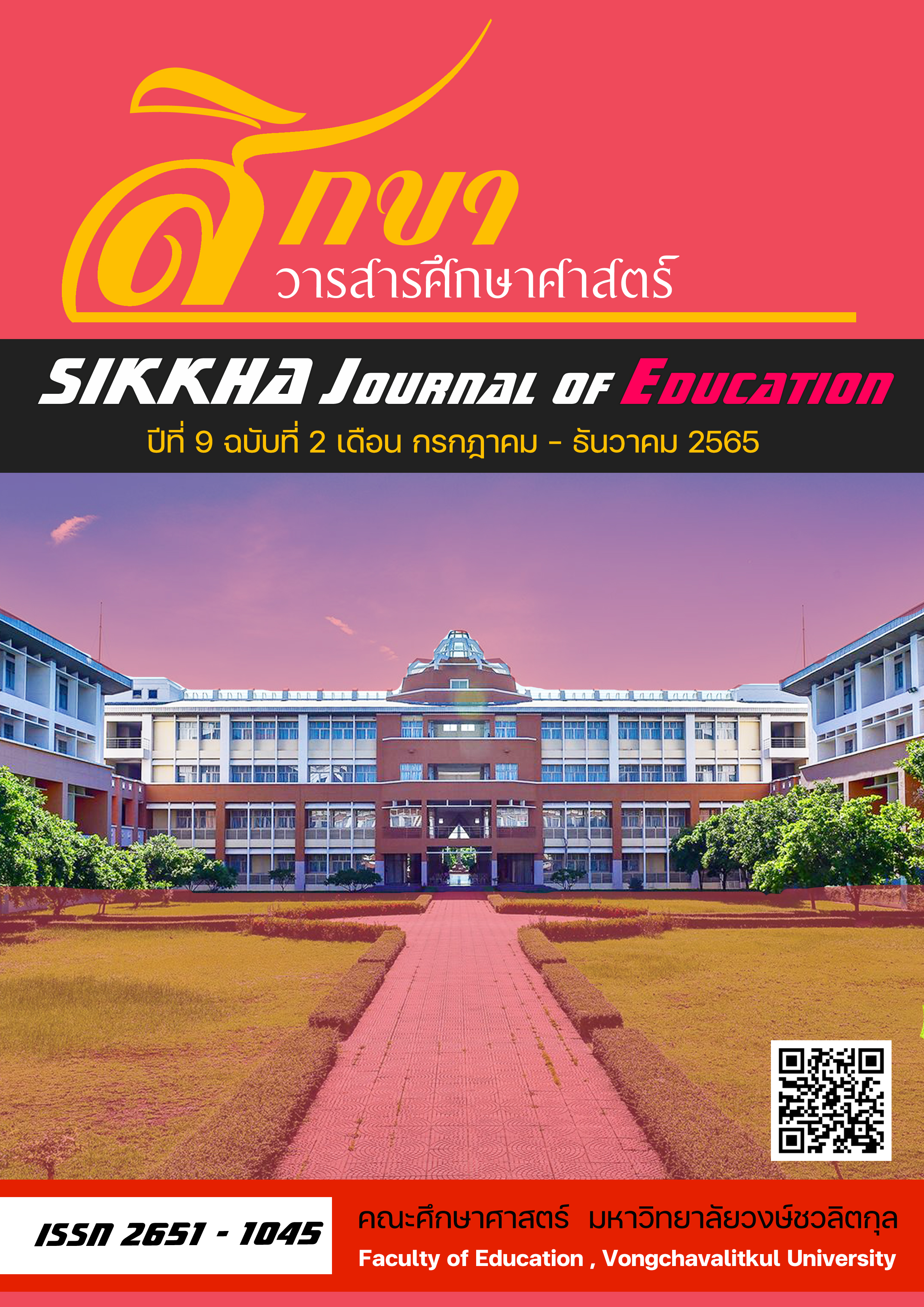ปัจจัยที่ส่งผลต่อการจัดการนวัตกรรมในชั้นเรียนของครูโรงเรียนพื้นที่นวัตกรรมการศึกษาจังหวัดระยอง
คำสำคัญ:
ปัจจัยที่ส่งผล, การจัดการ, นวัตกรรมในชั้นเรียน, พื้นที่นวัตกรรมการศึกษาบทคัดย่อ
การวิจัยครั้งนี้มีวัตถุประสงค์เพื่อ 1) ศึกษาระดับการจัดการนวัตกรรมในชั้นเรียนและระดับของปัจจัยที่ส่งผลต่อการจัดการนวัตกรรมในชั้นเรียน 2) ศึกษาความสัมพันธ์ระหว่างปัจจัยที่ส่งผลกับระดับการจัดการนวัตกรรมในชั้นเรียน 3) ศึกษาปัจจัยที่ส่งผลต่อการจัดการนวัตกรรมในชั้นเรียน และ 4) สร้างสมการพยากรณ์การจัดการนวัตกรรมในชั้นเรียนของครูโรงเรียนพื้นที่นวัตกรรมการศึกษาจังหวัดระยอง กลุ่มตัวอย่าง ได้แก่ ครูผู้สอนโรงเรียนในพื้นที่นวัตกรรมการศึกษาจังหวัดระยอง จำนวน 447 คน โดยใช้วิธีการสุ่มแบบแบ่งชั้นภูมิ เครื่องมือที่ใช้ในการวิจัย ได้แก่ แบบสอบถามเพื่อการวิจัย มีค่าดัชนีความสอดคล้อง 0.60-1.00 และค่าความเที่ยง 0.92-0.98 สถิติที่ใช้ในการวิเคราะห์ข้อมูล ได้แก่ ความถี่ ร้อยละ ค่าเฉลี่ย ส่วนเบี่ยงเบนมาตรฐาน ค่าสัมประสิทธิ์สหสัมพันธ์ของเพียร์สันและใช้สถิติการถดถอยพหุคูณ ผลการวิจัยพบว่า 1) ระดับการจัดการนวัตกรรมในชั้นเรียนและระดับของปัจจัยที่ส่งผลต่อการจัดการนวัตกรรมในชั้นเรียน อยู่ในระดับมาก 2) ปัจจัยที่ศึกษาทุกปัจจัยมีความสัมพันธ์ทางบวกกับการจัดการนวัตกรรมในชั้นเรียน อย่างมีนัยสำคัญทางสถิติที่ระดับ .01 3) ปัจจัยที่ส่งผลต่อการจัดการนวัตกรรมในชั้นเรียน คือ ปัจจัยด้านการรับรู้ความสามารถร่วมกันของครู (X3) ทักษะการคิดเชิงนวัตกรรม (X1) คุณลักษณะของผู้นำเชิงนวัตกรรม (X2) ส่งผลต่อการจัดการนวัตกรรมในชั้นเรียน อย่างมีนัยสำคัญทางสถิติที่ระดับ .01 และ 4) สามารถพยากรณ์การจัดการนวัตกรรมในชั้นเรียนได้ร้อยละ 78.30 (R2=.7830) สมการพยากรณ์ได้ดังนี้สมการพยากรณ์ในรูปคะแนนดิบ Y = .504 + .367X3 + .300X1 + .211X2 และสมการพยากรณ์ในรูปคะแนนมาตรฐาน Z = .366Zx3 + .357Zx1 + .235Zx2เอกสารอ้างอิง
กระทรวงศึกษาธิการ. (2562). นโยบายและจุดเน้นของกระทรวงศึกษาธิการ. กรุงเทพฯ: สำนักงานคณะกรรมการการศึกษาขั้นพื้นฐาน กระทรวงศึกษาธิการ.
กัลยา สร้อยสิงห์. (2563). ปัจจัยที่ส่งผลต่อทักษะการเรียนรู้และนวัตกรรมในศตวรรษที่ 21 ของนักศึกษาวิทยาลัยดุสิตธานี. วารสารวิทยาลัยดุสิตธานี, 14(2), 486-501.
ขวัญชนนก แสงท่านั่ง. (2563). รูปแบบการพัฒนาสถานศึกษาสู่องค์กรแห่งนวัตกรรมสำหรับสถานศึกษาขั้นพื้นฐาน. วารสารสังคมศาสตร์และมานุษยวิทยาเชิงพุทธ, 5(7), 153-168.
ฐิตินันท์ นันทะศรี, วาโร เพ็งสวัสดิ์, วัลนิกา ฉลากบาง, และพรเทพ เสถียรนพเก้า. (2563). ภาวะผู้นำเชิงนวัตกรรมของผู้บริหารสถานศึกษา. วารสารบัณฑิตศึกษา มหาวิทยาลัยราชภัฏสกลนคร, 17(79), 11-20.
ทิศนา แขมมณี. (2559). ศาสตร์การสอน: องค์ความรู้เพื่อการจัดกระบวนการเรียนรู้ที่มีประสิทธิภาพ (พิมพ์ครั้งที่ 20). กรุงเทพฯ: สำนักพิมพ์แห่งจุฬาลงกรณ์มหาวิทยาลัย.
บุญชม ศรีสะอาด. (2560). การวิจัยเบื้องต้น (พิมพ์ครั้งที่ 10). กรุงเทพฯ: สุวีรยาสาส์น.
พระราชบัญญัติพื้นที่นวัตกรรมการศึกษา พ.ศ. 2562. (2562, 26 เมษายน). ราชกิจจานุเบกษา. เล่ม 136 ตอนที่ 56. หน้า 102-120.
แพรลฎา พจนารถ และกฤษดา เชียรวัฒนสุข. (2563). ภาวะผู้นำเชิงนวัตกรรมเพื่อความได้เปรียบในการแข่งขันขององค์การในศตวรรษที่ 21. วารสารวิทยาการจัดการปริทัศน์, 22(1), 241-257.
วิวัฒน์ มีสุวรรณ์. (2563). ปัจจัยที่ส่งผลต่อการสร้างสรรค์นวัตกรรมด้านสื่อการเรียนการสอนของครูในสถานศึกษาสำหรับ ปฏิบัติการสอน เครือข่ายมหาวิทยาลัยนเรศวร. วารสารศึกษาศาสตร์ มหาวิทยาลัยนเรศวร, 22(1), 220-236.
สำนักงานคณะกรรมการกฤษฎีกา. (2562). พระราชบัญญัติพื้นที่นวัตกรรมการศึกษา. กรุงเทพฯ: กองกฎหมายการศึกษาและ วัฒนธรรม, สำนักงานคณะกรรมการกฤษฎีกา.
สุกัญญา แช่มช้อย. (2555). แนวคิดนวัตกรรมสำหรับการบริหารสถานศึกษาในศตวรรษที่ 21. วารสารศึกษาศาสตร์ มหาวิทยาลัยนเรศวร, 14(2), 117-128.
อรชร ปราจันทร์ และสุกัญญา แช่มช้อย. (2561). การบริหารสถานศึกษาขั้นพื้นฐานเพื่อพัฒนาทักษะการคิดเชิงนวัตกรรม. วารสารการบริหารและนวัตกรรมการศึกษา, 1(2), 53-70.
อรอนงค์ โรจน์วัฒนบูลย์. (2553). การพัฒนาตัวแบบผู้นำเชิงนวัตกรรม (วิทยานิพนธ์รัฐประศาสนศาสตรดุษฎีบัณฑิต). สถาบันบัณฑิตพัฒนบริหารศาสตร์, กรุงเทพฯ.
Enders, C. K. (2001). The Performance of the Full Information Maximum Likelihood Estimator in Multiple Regression Models with Missing Data. Educational and Psychological Measurement, 6(1), 713–740.
Horth, D. & Buchner, D. (2014). Innovation Leadership; How to use Innovation to Lead Effectively, Work Collaboratively and Drive Results. Retrieved from: http://www.ccl.org/leadership/pdf/researCh./InnovationLeadership.pdf
Hoy, W. K. & Miskel, C. G. (2013). Educational Administration: Theory Research and Practice (9th ed). New York: McGraw-Hill.
ดาวน์โหลด
เผยแพร่แล้ว
รูปแบบการอ้างอิง
ฉบับ
ประเภทบทความ
สัญญาอนุญาต
ลิขสิทธิ์ (c) 2022 สิกขา วารสารศึกษาศาสตร์

อนุญาตภายใต้เงื่อนไข Creative Commons Attribution-NonCommercial-NoDerivatives 4.0 International License.



